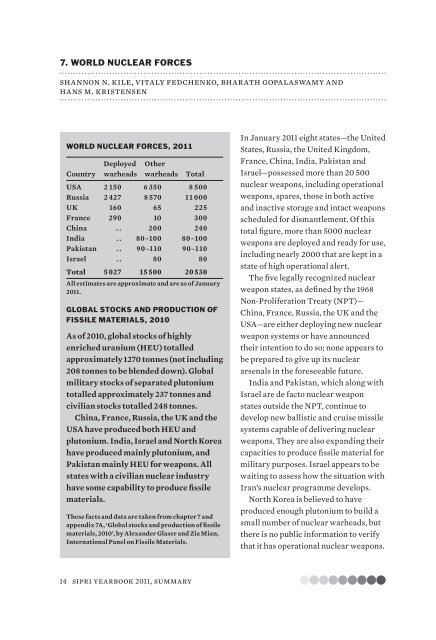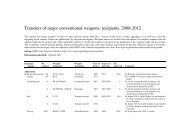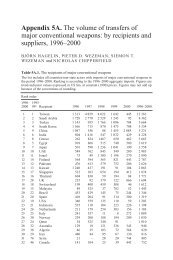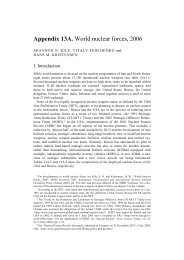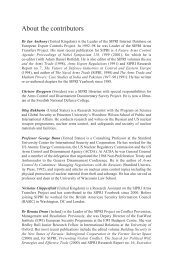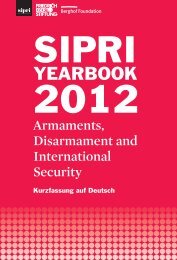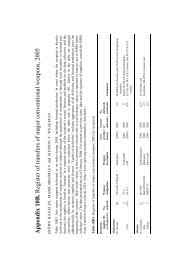SIPRI Yearbook 2011: Armaments, Disarmament and International ...
SIPRI Yearbook 2011: Armaments, Disarmament and International ...
SIPRI Yearbook 2011: Armaments, Disarmament and International ...
You also want an ePaper? Increase the reach of your titles
YUMPU automatically turns print PDFs into web optimized ePapers that Google loves.
7. WORld nuclEAR fORcES<br />
shannon n. kile, vitaly fedchenko, bharath gopalaswamy <strong>and</strong><br />
hans m. kristensen<br />
WORld nuclEAR fORcES, <strong>2011</strong><br />
Deployed Other<br />
Country warheads warheads Total<br />
USA 2 150 6 350 8 500<br />
Russia 2 427 8 570 11 000<br />
UK 160 65 225<br />
France 290 10 300<br />
China . . 200 240<br />
India . . 80–100 80–100<br />
Pakistan . . 90–110 90–110<br />
Israel . . 80 80<br />
Total 5 027 15 500 20 530<br />
All estimates are approximate <strong>and</strong> are as of January<br />
<strong>2011</strong>.<br />
GlOBAl stocKS <strong>and</strong> PRODuctIOn of<br />
fISSIle matERIAls, 2010<br />
As of 2010, global stocks of highly<br />
enriched uranium (HEU) totalled<br />
approximately 1270 tonnes (not including<br />
208 tonnes to be blended down). Global<br />
military stocks of separated plutonium<br />
totalled approximately 237 tonnes <strong>and</strong><br />
civilian stocks totalled 248 tonnes.<br />
China, France, Russia, the UK <strong>and</strong> the<br />
USA have produced both HEU <strong>and</strong><br />
plutonium. India, Israel <strong>and</strong> North Korea<br />
have produced mainly plutonium, <strong>and</strong><br />
Pakistan mainly HEU for weapons. All<br />
states with a civilian nuclear industry<br />
have some capability to produce fissile<br />
materials.<br />
These facts <strong>and</strong> data are taken from chapter 7 <strong>and</strong><br />
appendix 7A, ‘Global stocks <strong>and</strong> production of fissile<br />
materials, 2010’, by Alex<strong>and</strong>er Glaser <strong>and</strong> Zia Mian,<br />
<strong>International</strong> Panel on Fissile Materials.<br />
In January <strong>2011</strong> eight states—the United<br />
States, Russia, the United Kingdom,<br />
France, China, India, Pakistan <strong>and</strong><br />
Israel—possessed more than 20 500<br />
nuclear weapons, including operational<br />
weapons, spares, those in both active<br />
<strong>and</strong> inactive storage <strong>and</strong> intact weapons<br />
scheduled for dismantlement. Of this<br />
total figure, more than 5000 nuclear<br />
weapons are deployed <strong>and</strong> ready for use,<br />
including nearly 2000 that are kept in a<br />
state of high operational alert.<br />
The five legally recognized nuclear<br />
weapon states, as defined by the 1968<br />
Non-Proliferation Treaty (NPT)—<br />
China, France, Russia, the UK <strong>and</strong> the<br />
USA—are either deploying new nuclear<br />
weapon systems or have announced<br />
their intention to do so; none appears to<br />
be prepared to give up its nuclear<br />
arsenals in the foreseeable future.<br />
India <strong>and</strong> Pakistan, which along with<br />
Israel are de facto nuclear weapon<br />
states outside the NPT, continue to<br />
develop new ballistic <strong>and</strong> cruise missile<br />
systems capable of delivering nuclear<br />
weapons. They are also exp<strong>and</strong>ing their<br />
capacities to produce fissile material for<br />
military purposes. Israel appears to be<br />
waiting to assess how the situation with<br />
Iran’s nuclear programme develops.<br />
North Korea is believed to have<br />
produced enough plutonium to build a<br />
small number of nuclear warheads, but<br />
there is no public information to verify<br />
that it has operational nuclear weapons.<br />
14 sipri yearbook <strong>2011</strong>, summary


